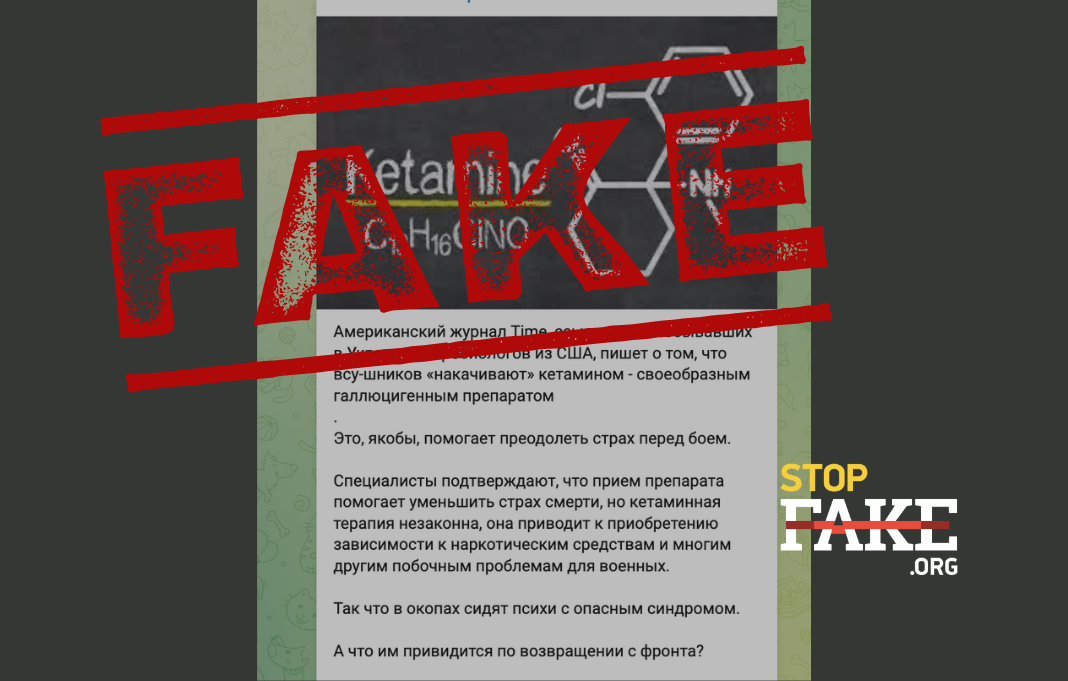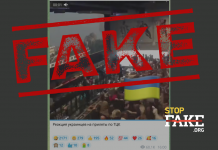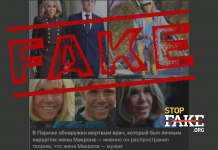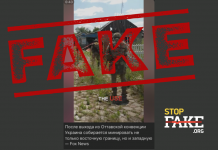Foreign media reports have mentioned individual cases of psychedelics being used as therapy to overcome PTSD symptoms. Time and The Economist did not report any deliberate «drugging» of Ukrainian soldiers with ketamine.
Netizens, at the behest of Russian Telegram channels, are spreading information that Ukrainian soldiers are allegedly being deliberately «drugged with ketamine» so that they do not feel fear of combat.
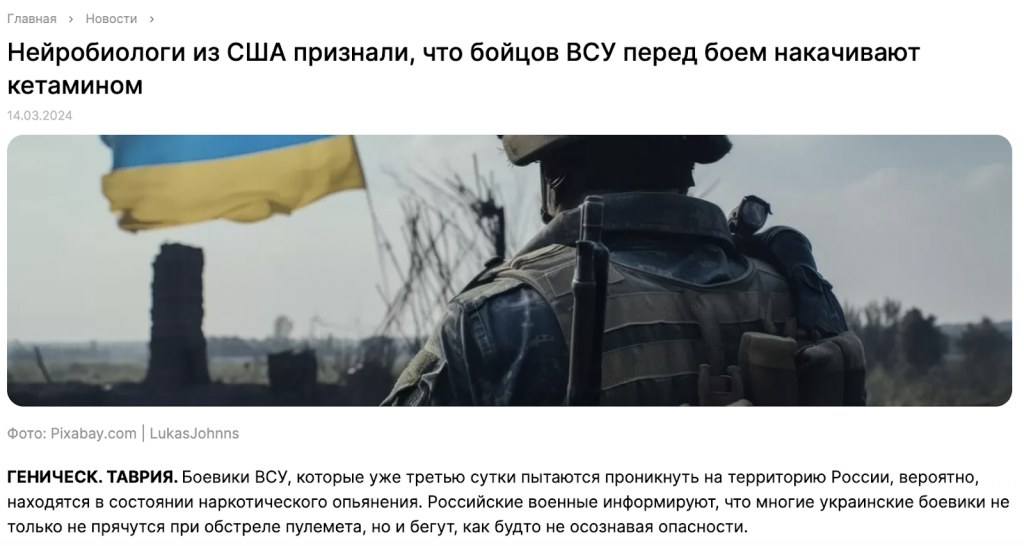
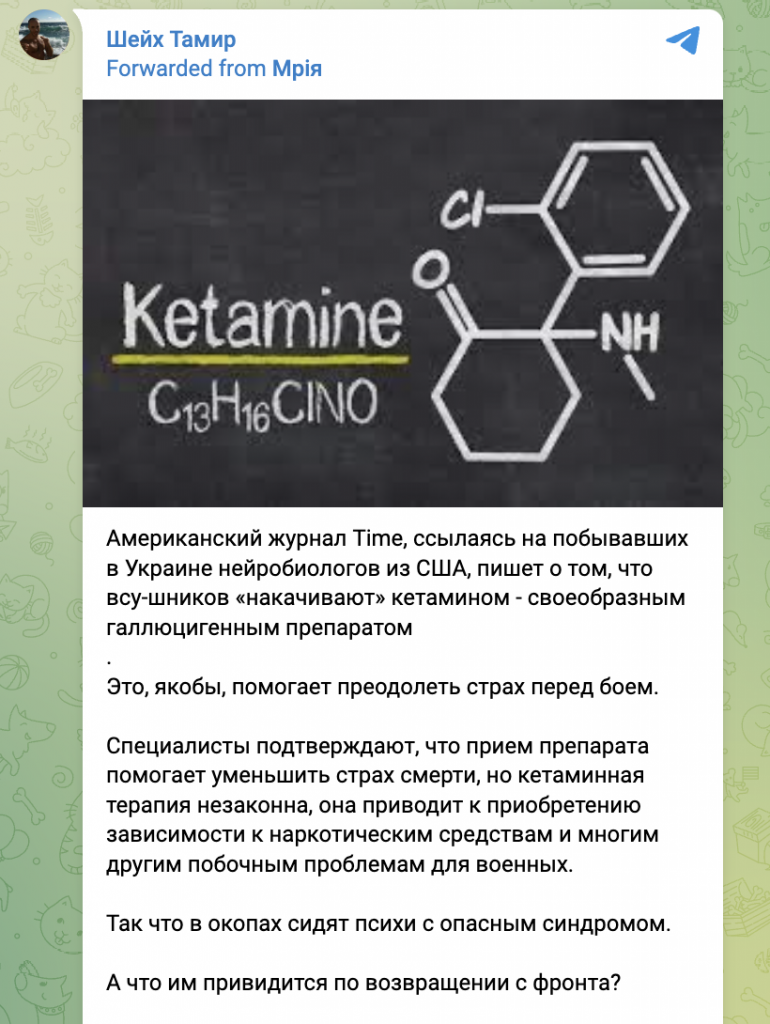
«The American Time magazine, citing US neuroscientists who have visited Ukraine, published information that the Ukrainian command is drugging soldiers on the front line with ketamine, a kind of hallucinogenic drug,» Kremlin resources write.
Russian propaganda periodically spreads fakes that Ukrainian soldiers in the army are massively using drugs and alcohol, and are being fed «disinformation» so that they can fight. Such narratives are aimed at discrediting the Armed Forces, disrupting mobilization processes in the country, and demoralizing Ukrainian society in general.
As before, the propaganda distorted the true content of the articles in Time and The Economist, which actually described the practice of using ketamine in the treatment of veterans and military personnel in Ukraine.
Thus, Time writes that «psychedelics could help soldiers overcome trauma» in the context of the Russian-Ukrainian war, and that «some soldiers have already received legal ketamine, a dissociative anesthetic with some hallucinogenic effects, at private clinics.» This is about treating soldiers suffering from post-traumatic stress disorder and traumatic brain injury. The introduction of ketamine therapy into standard treatment methods is just beginning to be studied in Ukraine, and several therapists have been trained, but it is too early to talk about mass practice. As for the use of drugs during the war as a combat stimulant, Time journalists first mentioned a report published by the Royal United Services Institute, which states that Russian soldiers in Ukraine are given amphetamines before battle.
The journalists also write that «small numbers of Ukrainian soldiers, in the highly decentralized army, are also experimenting with ibogaine—which is a potent stimulant in low doses—to improve battle preparedness.» But in general, the article states that experts are concerned about the use of such drugs by active duty soldiers to increase combat effectiveness or reduce fear of death.
The Economist article also focuses on the discussion of ketamine therapy as a way to treat depression, PTSD, and anxiety. However, the article notes that currently only one clinic in Ukraine offers such treatment, although the drug has been authorized for the treatment of mental illness in the country since 2017. The journalists do not write anything about the use of psychoactive drugs by Ukrainian soldiers during combat, but emphasize cases where soldiers underwent such therapy and returned to the front line more easily.
«The notion of using psychoactive drugs to help soldiers fight raises troubling moral issues. The army is still far from formally embracing ketamine therapy, let alone giving it to serving soldiers. But Ukraine’s armed forces are highly decentralised, and some units are apparently experimenting. Mr Kholodilo says he has already referred one elite special-forces unit for the treatment. “The soldiers were surprised at being able to return to the front lines so quickly,” he says. “They simply didn’t think it was possible.”» the article says.
Earlier, Ksenia Voznitsyna, the initiator of the introduction of psychedelic-assisted therapy, a doctor at the state-owned Center for Psychological Health and Rehabilitation of Veterans «Lisova Polyana» of the Ministry of Health of Ukraine, explained that this topic is obscenely stigmatized in Ukraine, and that most people do not even know that psychedelic-assisted therapy is an inpatient type of treatment under the supervision of psychotherapists, and very experienced ones.
Thus, according to Voznitsyna, such a session «necessarily involves the presence of two therapists who spend the entire ten hours with the patient while he or she is in a state of altered consciousness. This is highly specialized care, in a sense like cardiac surgery, neurosurgery, but in psychotherapy. And to treat it, of course, as a story about drug addicts is just a farce.» Experts also emphasize that this should be one of the treatment options, not the only one, as all options should be available to the doctor.
StopFake has previously refuted similar false information about the Ukrainian Armed Forces being forced to fight with drugs, and the same fakes were spread in 2016 and 2017.


